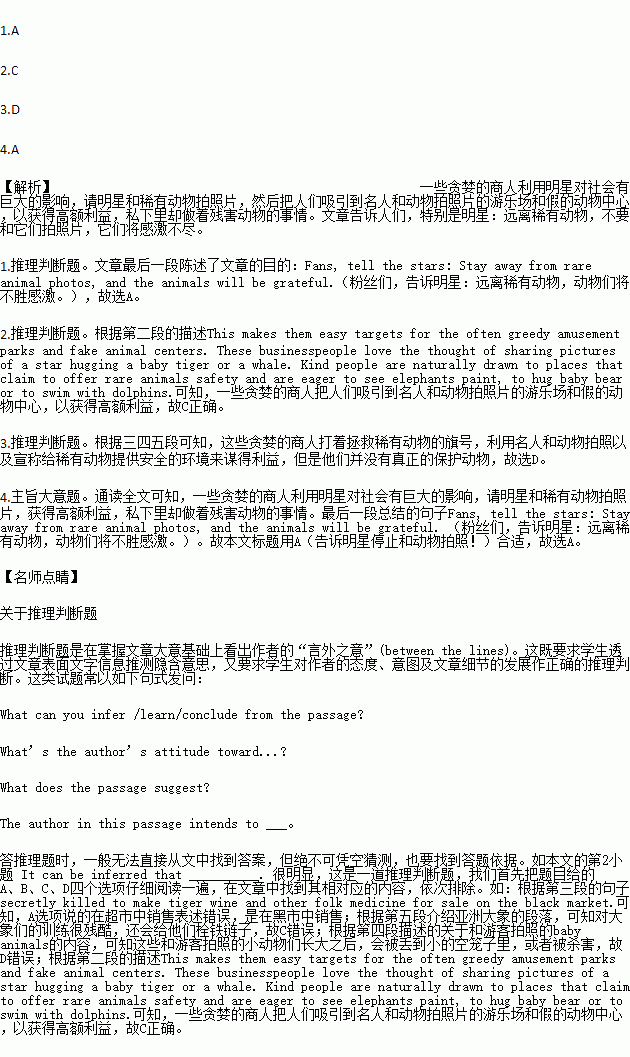题目内容
Famous people have a lot of influence on cultural trends, like it or not. When Amal Clooney wears a Stella McCarney dress, sales go way up. However, one trend that seems harmless—but is actually damaging—is the pressure on stars to have their photos taken with rare animals.
Famous people who are asked to have photos taken with wild animals for a magazine spread or who do so while on vacation always have good intentions and even love animals. This makes them easy targets for the often greedy amusement parks and fake animal centers. These businesspeople love the thought of sharing pictures of a star hugging a baby tiger or a whale. Kind people are naturally drawn to places that claim to offer rare animals safety and are eager to see elephants paint, to hug baby bear or to swim with dolphins. However, it has shown that many of these businessmen are breeders, dealers or exhibitors that are using Hollywood’s goodwill for their own ends.
At the recently closed Tiger Temple in Thailand, 40 dead tiger cubs(幼崽) were found in a freezer, secretly killed to make tiger wine and other folk medicine for sale on the black market. But it isn’t just the “tiger temples” that are being closed down. The number of tourist traps using word like “rescue” in their names has increased greatly in recent years.
Many businessmen continually breed the animals just so they’ll have a constant supply of young animals in order to charge money for photos to people. Of course the babies are cute but they grow fast, and within a few weeks they are too big to handle. They’ll spend the rest of their lives, sometimes decades, in small and empty cages — or even be killed.
In some Asian countries, elephants are kept in camps. A few camps are working to help elephants in trouble, but the vast majority are not, and training methods are cruel. As soon as the cameras are gone after someone like Prince William takes 0a photo with an elephant, the chains go back on.
Fans, tell the stars: Stay away from rare animal photos, and the animals will be grateful. Of course, you don’t have to be famous to make a difference. Whether right here at home or at a place abroad, every one of us must fight the temptation to take a photo with an elephant or hug a baby tiger.
1.The author intends to make an appeal that ________.
A. all people including stars should refuse to take photos with rare animals
B. measures should be taken to protect the rare animals
C. bans should be issued to limit celebrities’ behavior
D. warns of wild animals should be given to the public
2.It can be inferred that ________.
A. tiger wine and folk medicine made from tiger babies are sold in the supermarket
B. most of the elephants in Asia are treated well in camps
C. people are attracted to amusement parks and fake animal centers where celebrities share photos
D. when the baby animals that take photos with tourists grow up, they will be set free
3.Businessmen use the following tricks to make profits EXCEPT ________.
A. in the name of rescuing rare animals
B. take advantage of famous people to take photos with animals
C. claim to offer rare animals safety
D. protection of rare animals
4.Which of the following do you think is the best title?
A. Tell stars to stop!
B. Be careful when sharing photos on media!
C. No sale, no killing!
D. Rescue the endangered animals!

